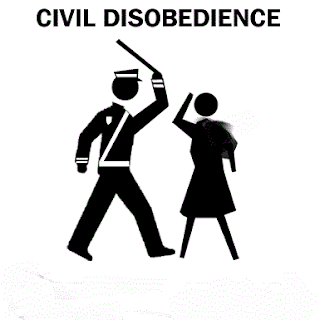![The Underlying Meaning of Civil Disobedience: [Essay Example], words GradesFixer meaning of civil disobedience movement](https://iascurrent.com/wp-content/uploads/2020/10/Screenshot_21.png)
Mahatma Gandhi Civil Disobedience Movement The Civil Disobedience Movement led by Mahatma Gandhi, in the year was an important milestone in the history of Indian Nationalism. 11/20/ · Martin Luther King's response to them is composed of brilliant rhetoric and logical arguments. He points out the violence and injustice blacks in the South The Civil disobedience movement started with Gandhiji’s historic ‘Dandi March’. Gandhiji walked miles through villages of Gujarat. He reached Dandi on 6 April He inaugurated the Civil Disobedience movement by picking up a handful of salt. Gandhiji and other prominent leaders were arrested. Their arrest led to a mass demonstration. In Peshawar, Khan Abdul Gaffar Khan took an
Mahatma Gandhi Civil Disobedience Movement
The Lahore Congress of authorized the Working Committee to launch a programme of civil disobedience. Gandhiji was invested with full powers to launch the Civil Disobedience movement. He gave his ultimatum to Lord Irwin on 31 January His ultimatum being ignored the Civil Disobedience was launched. Inhaving a meeting with Ramsay Macdonald, the Prime Minister of England, Lord Irwin returned to India and declared that the object of the British Government was to grant India dominion status.
But the Prime Minister under pressure of the conservative leaders, failed to keep his promise. When Gandhiji met Lord Irwin in Decemberthe latter refused to make any commitment regarding dominion status. According to Amales Tripathi, the main cause of the Civil Disobedience movement was worldwide economic depression during the period Young leaders of the Congress became impatient for a movement.
The revolutionaries were not sitting idle. The organizations of the works and the peasants gathered strength under organizations of the workers and the peasants gathered strength under the leadership of the communists.
All these events led Gandhiji to feel the necessity of launching Civil Disobedience movement. Gandhiji walked miles through villages of Gujarat. He reached Dandi on 6 April He inaugurated the Civil Disobedience movement by picking up a handful of salt, meaning of civil disobedience movement.
Gandhiji and other prominent leaders were arrested. Their arrest led to a mass demonstration. In Peshawar, Khan Abdul Gaffar Khan took an active role. Civil Disobedience in different forms continued in different provinces. Special stress was laid on boycott of foreign good. In eastern India, payment of chowkidari tax was refused. This no-tax campaign became very popular in Bihar. In Bengal, J. Sengupta defied Government laws by reading openly the books banned by the government.
Defiance of forest laws assumed a mass character in Maharashtra. The movement had taken a fire hold in provinces of U. Tamil Nadu, Andhra Pradesh and Assam. The Gandhi-Irwin Pact and the Second Round Table Conference having failed, the movement was resumed with new zeal.
The government adopted severe repressive measured. About persons passed through jail in course of the movement. The meaning of civil disobedience movement killed two prisoners meaning of civil disobedience movement Hijli Detention Camp. At Bundur, T. Naidu was beaten unconscious. The Congress was declared an illegal organization.
Punitive taxes were imposed. According to the wish of Gandhiji, the Congress withdrew the Civil Disobedience in Though the movement failed but it had great significance. The movement marked an important state in the progress of the freedom struggle.
The movement received global attention. Imports from Britain had fallen considerably. The participation of the Muslims was significant. Even middle and upper class Muslim women were active. Importance of Akbar Mughal Emperor. Non-cooperation Movement: Introduction, Causes, Result and Importance. Economic History of India. History of India. Indian Forts. Swadeshi Movement in India. How old is the culture in India? When was the French East India Company Formed.
National Symbols of India. How did the British come meaning of civil disobedience movement Rule in India. Where is French India. For How Many Years did the British Rule India. Home History Modern India Causes, Effects and Significance of Civil Disobedience Movement in India Modern India.
By IMP CENTER. Prev Post Importance of Akbar Mughal Emperor. Next Post Non-cooperation Movement: Introduction, Causes, Result and Importance. You might also like. Modern India. Prev Next, meaning of civil disobedience movement. Sign in. Welcome, Login to your account. Forget password? Remember me. Sign in Recover your password. A password will be e-mailed to you.
CIVIL DISOBEDIENCE MOVEMENT/NATIONALISM IN INDIA/PART-4/REAL MOVIE ANIMATED VIDEO/SST/CLASS 10/CBSE
, time: 5:26CIVIL DISOBEDIENCE | meaning in the Cambridge English Dictionary

Civil disobedience is breaking a law that isn’t agreed with. Henry Thoreau, a transcendentalist, encouraged peaceful civil disobedience. The law must be something that many people find bad and they all must act against it, whether it be not paying taxes or petitioning Mahatma Gandhi Civil Disobedience Movement The Civil Disobedience Movement led by Mahatma Gandhi, in the year was an important milestone in the history of Indian Nationalism. 11/20/ · Martin Luther King's response to them is composed of brilliant rhetoric and logical arguments. He points out the violence and injustice blacks in the South
No comments:
Post a Comment